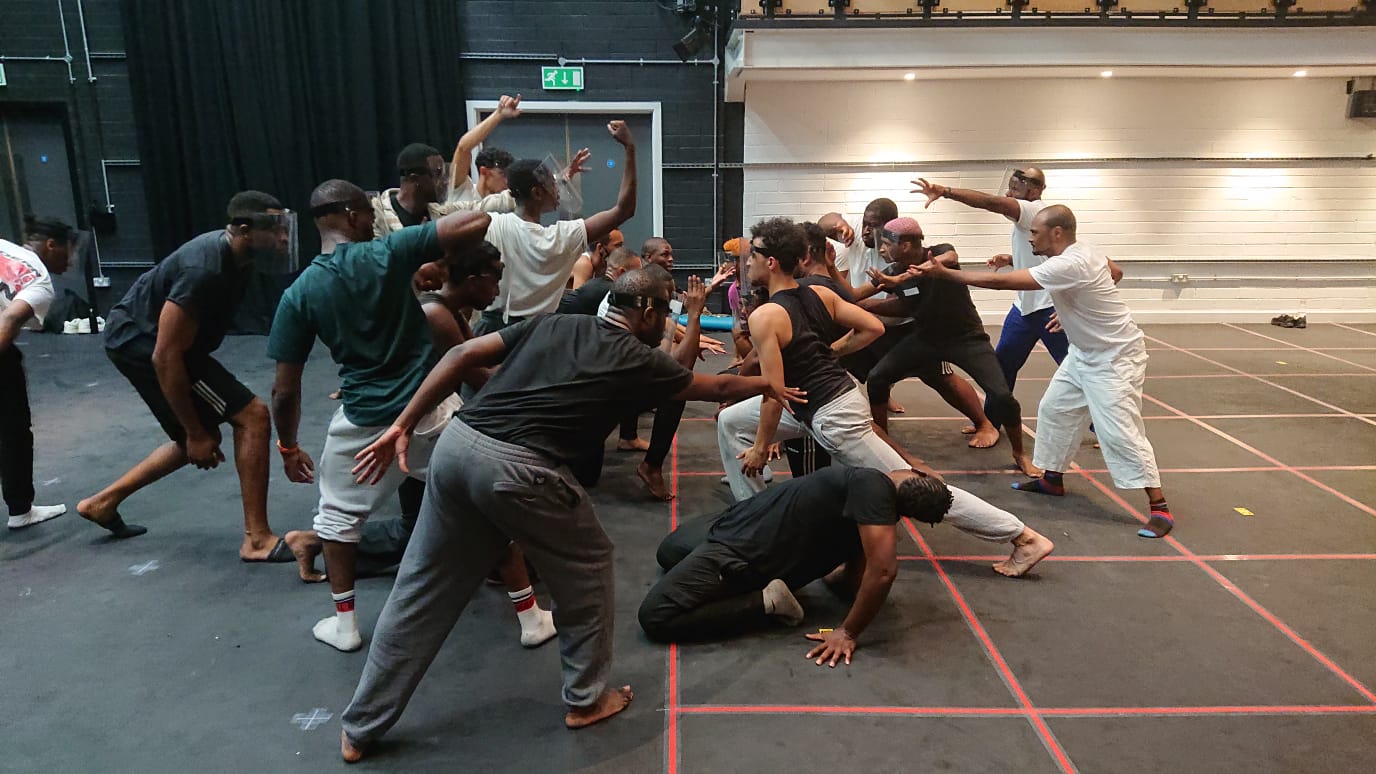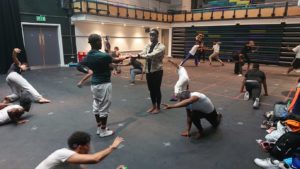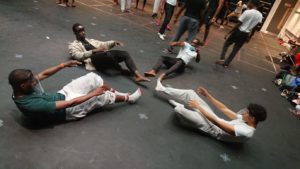News
26 April 2021 / Grants and Awards
Black Queer Actors’ Playground

image courtesy of Wofai JE
Tristan Fynn-Aiduenu received one of our Covid-19 Support grants last year to facilitate a very specifically targeted workshop. He writes about it for us here:
In 2020, I was awarded a £200 grant from the Society of Theatre Research to look into the need for Black Queer Spaces for Queer Black Actors.
What started it off…
First and foremost, I wanted to create a project that allowed theatre to still exist in person during lockdown. Of course, the measures in place at the time limited us to only have up to 30 people in a gathered space, so naturally the only thing that I felt could be done was producing workshops. However, I felt that the survival of the theatre industry itself is threatened not only by the lockdown shutdown but by the growing perception that theatre is in any case elitist and inaccessible. Therefore I judged upskilling workshops to be less productive and necessary than workshops going back to basics of identity, in order to challenge the barriers that hold people back in terms of class, ableism, race etc.
This is not to say that there is no place for upskilling workshops and I feel there should be much more moving forward for all types of people in order to increase pathways to surviving in this industry and I will definitely be doing more of that once lockdown measures ease, nevertheless I feel that lockdown has allowed us to reanalyse what art – in this case theatre – could be when it is not so driven by business. I wanted to create a workshop that was not so based on the idea of moulding yourself to be part of the industry, but more of a bespoke space to simply breathe, chat, experiment and enjoy the artform that we love as a way of looking at the world in general – perhaps this could be seen to be viewing the workshop for a socialist, holistic lens instead of a product-based capitalist one.
Delving deeper into these initial structures, I realised I achieved that through “Play” in much of my practice. Psychologist and Play researcher Peter Gray described play in the most succinct way I have found so far. He states that “Play” is, “…activity that is (1) self-chosen and self-directed; (2) intrinsically motivated; (3) guided by mental rules; (4) imaginative; and (5) conducted in an active, alert, but relatively non-stressed frame of mind.” (Gray, 2013). I believe in my workshops in particular follow the definition of being playful well: (1) as you choose to go into them and often include devising (4), hybrid of both group work and individual development work with other actors of the same field (5,2) and are still run in a clear structure – usually with a title – by me (3).
In my workshops, rehearsals and even audition rooms, my primary focus is usually on unlocking and cultivating an actor’s capacity to imagine and stir the imagination in an audience. Of course, I am very aware all actors need a capacity of imagination to stir a theatre audience’s own but, in my work, there is such detail in the storytelling of imagination (usually poetic, verse, heavy multi-rolling or magical realist) and weight on the actor making the audience believe these things actually happened. In addition, as my work sometimes explores the ‘Otherness’ spirituality, physical and ensemble movement has become a key component in coding these components onstage. Combining these things together in the workshop environment seemed to activate a sense of both joy and release from the majority of the participants in my rooms. Both these factors, Joy and Release, I feel are the most essential aspects of “Play”. Through “Play”, I got to see the inner workings of my participants’ mind in a safe and controlled environment that allowed them to contribute exciting creative and intellectual ideas about the world willingly; Through “Play”, my participants allowed themselves to take risks both physically and mentally in order to just see where it takes them and shakes off the usual competitive atmosphere in these acting spaces; Through “Play”, my participants got also to truly act as an active audience as they were genuinely interested in what could be interpreted & discussed. This type of “Play” space is what I wanted to bring to people in the workshop I decided to create – a “Playground”.
In planning this workshop, I first thought about tailoring towards Black Men. This was initially because, as a Black man, I could tailor the workshop towards the need for us to express ourselves via drama. However, as I began to home in on my target participant, I thought about my own intersections as a Black Queer Man and realised that I had never seen a dedicated space for theatre-makers like me. In addition, I had never seen a space at that time for just Black Queer people to explore and congregate via theatre workshops at all. I had noticed a resurgence in Yoga Classes, Discussion Groups and even Creative Writing Groups – but very few things involving theatre (outside of the Ballroom scene of course). I had been to some of these workshops and the experience was so nourishing because it was a space for Black Queer people to meet and possible try a brand-new thing together. Louis Mendee on behalf of the UK Queer online magazine AZ Mag talks about the need for more queer spaces like the ones I have encountered. Louis states,
“growing up LGBTQ is hard. Which is why queer people continue to create environments away from the mainstream, where they can heal, nourish, and forget about the external reality. These ‘safe spaces’ often mean different things to different people, but perhaps most importantly, they provide a rare opportunity for people to be themselves around people who get it.”
Louis then goes on to talk about the need for spaces by more Queer People of Colour by when talking about LGBTQ arts collective Duckie’s new initiative, Family Dinner:
“Queer people of colour, for example, have to deal with the added component of race at the intersection of their identity and, as such, their personal struggle for liberation is often overlooked within the movement. This silencing of PoC voices makes it even more important that we can carve out spaces within the community, and work through the specific issues and experiences that affect us. Which is why Duckie’s latest initiative, Family Dinner, is so important; a world-apart from the club-scene, it offers a rare opportunity “for Black, queer and trans people to talk about their health, be with each other in low-key environments, care for each other and relax”.” (Mendee, 2017)
This told me, ultimately there was a gap in the market that I knew I could fill.
In structuring the workshop, I knew I wanted a section that allowed me to use my expertise in Storytelling in a holistic way, as well as make way for conversation. I also realised, with having all these Black Queer men in one space, there are opportunities to connect with other Black Queer theatre makers (particularly writers and directors) who would truly benefit from testing out any material they have about Black Queer people with actual Black Queer People. I had noticed that I had not seen one piece of theatre that centred Black Queer Men that was also written by a Black Queer person in 10 years. This space would be the perfect place for multifaceted critique and short R&Ds of such work.
What we did…
Thanks to the generous offer from Theatre Peckham, I was able to pilot the Playground under their Young, Black & Gifted Season with free space in their main theatre (taking into account COVID-19 restrictions). As I wanted to pilot the scheme first, I recruited via my social media & friendship connections for any Black Queer Men who would be interested in the experience and paid them both food & travel expenses to test with me. This resulted in a whopping 30 men signing up for the day and 20 men physically attended overall. With the extra money, I was able to pay for an assistant for the day who also took the photos you see included in this article.
We started the day off with a debrief by me about the contents of the day, ensuring this was a safe & confidential space and also the COVID regulations. Artistic Director Suzann McClean kicked off our day with a quick reaction game to wake up the participants’ minds. This was the perfect pathway into opening them up into my warm up exercise which was essentially aerobic circuit training. The Health Department at Harvard University confirms that aerobic exercise is an effective method to prepare the participants for the day because:

The mental benefits of aerobic exercise have a neurochemical basis. Exercise reduces levels of the body’s stress hormones, such as adrenaline and cortisol. It also stimulates the production of endorphins, chemicals in the brain that are the body’s natural painkillers and mood elevators. Endorphins are responsible for the “runner’s high” and for the feelings of relaxation and optimism that accompany many hard workouts.” (Harvard Medical School, 2011)
Now warmed up physically and mentally, I felt it was best to warm up spiritually with allowing them to feel the space with positive affirmations for themselves i.e. “I am Black and Black is Me”. In doing this, I believe the participants were also able state that the space will be safe and they will keep themselves safe in it– therefore trusting themselves to explore the space provided. The next set of exercises asked the participants to combine the mind, body and spirit to instant express what it was to be “Black”, “Queer” and “Men” as freely and big as possible. The result of improvisations harkens back to Improvisation theorist and director Keith Johnstone when he states that:
“the actor who will accept anything that happens seems supernatural; it’s the most marvellous thing about improvisation: you are suddenly in contact with people who are unbounded, whose imagination seems to function without limit.” (Johnstone, 1981)
The contact with “unbounded imaginations” produced joyful, physical theatre tableaus, machines and improvisations that allowed the participants to safely connect with each other and play with the similarities/differences of their responses. The expanse of their bodies, voices and imaginations in the exercises allowed a sense of release from shame and naturalistic constraint (something I find actors bounded due to naturalism being the default basis of most interactions in Drama). I guess, in the words of Johnstone, we attempted the “super-natural”.
Moving on from a very physical form of release, I wanted to move the day into a space to settle and converse. We sat and talked very candidly about our experiences of what it was to be a working actor that is also Black, queer and a man in Britain. This proved to be one of the most fruitful and fulfilling experiences for our participants. One participant stated that:
“I liked the discussion sharing experiences held in the large group circle, but obviously not everyone did/had the chance to speak, so maybe the same thing but in slightly smaller groups just so everyone has more of a chance of chipping in.” –BQAP participant 2020
I agree with the sentiment above that there where so many incoming opinions and passionate dialogues ignited, that in the next instalment I would have to reconfigure this section of the workshop. Nevertheless, the vibrancy of it proved how necessary it was. I also, personally, felt it was a part of the workshop that everyone had enough “rules” to “play” in because it was outside of the more abstract, theatrical work we were doing earlier. There was joy in the space to talk on these issues freely and release in knowing that these issues were much more likely to be empathised with and listened to by peers.
After an hour lunch, we returned into the group with theatre-makers joining us who had scripts or ideas to explore. We split off into smaller groups and took an hour to meet the artists and get something on its feet in time for a short playback. From screenplays, to stage plays to improvisation pieces and long form poems – the breadth of work in the room was astounding. The diversity in genre and form really excited the group. One participant stated that:
“I loved the exploration of new work especially the fact it centred on queer black characters. More of this, simple scene set-ups where actors can play about and explore a script. “– BQAP Participant 2020

This proved that the “Playground” gave queer people the ability to critique & direct these new stories in their newly found, safe theatrical space.
Finally, as we started with the aerobic, I ended it with a special yoga session run by Black Gay yogi Gerrard Martin. This allowed the participants to get the deepest relaxation in order to continue on with the rest of their day feeling light, re-energized and connected with the present.
What I want to do next…
I recognize the power of the “Playground” brought for these Black Men. Many have them have now started their own friendship groups, run workshops and staged Black Gay readings. The legacy of this one pilot workshop proved that through “Play”, the participants were enriched enough to continue to engage with theatre in this specific communal context well throughout Lockdown.
With this new space being formed and now in high demand, I would like to find avenues in which to financially support it to happen on a more regular basis. This will be likely through collaborations with Theatres and Charities with vested interested in developing Black Queer Audiences. In addition to this, I would like to create further “Playgrounds” for Black Queer Womxn and Black Queer Non-Binary people as I feel those are spaces that also are in need of play in the environment we are in currently.
Ultimately, taking on the first statement of theatre being in a precarious place due to its inaccessible nature, I actually do believe more work like this will truly give theatre in this country a lifeline. It is about “Playgrounds” that truly cultivates engaged theatrical responses and cares for the audiences it states it wants to welcome into their buildings – and not just lip service to tick boxes on their diversity quotas. It is about spaces that truly treasure a marginalised community’s joy and release through theatre-making, rather than production based mainly off their trauma and pain.
If any companies, charities or theatres would like to partner up with Black Queer Actors Playground, please contact me at www.trisfa.com/contact
Bibliography
Gray, P. (2013). Definitions of Play. Retrieved from Scholarpedia : http://www.scholarpedia.org/article/Definitions_of_Play
Harvard Medical School. (2011, July). Exercising To Relax. Retrieved from Harvard Health Publishing Website: https://www.health.harvard.edu/staying-healthy/exercising-to-relax
Johnstone, K. (1981). Impro: Improvisation and the Theatre. New York: Routledge/Theatre Arts Books.
Mendee, L. (2017, September 5). Why Safe Spaces Are Important for QTIPoC. Retrieved from AZ Magazine Web Site: https://azmagazine.co.uk/safe-spaces-important-qtpoc/